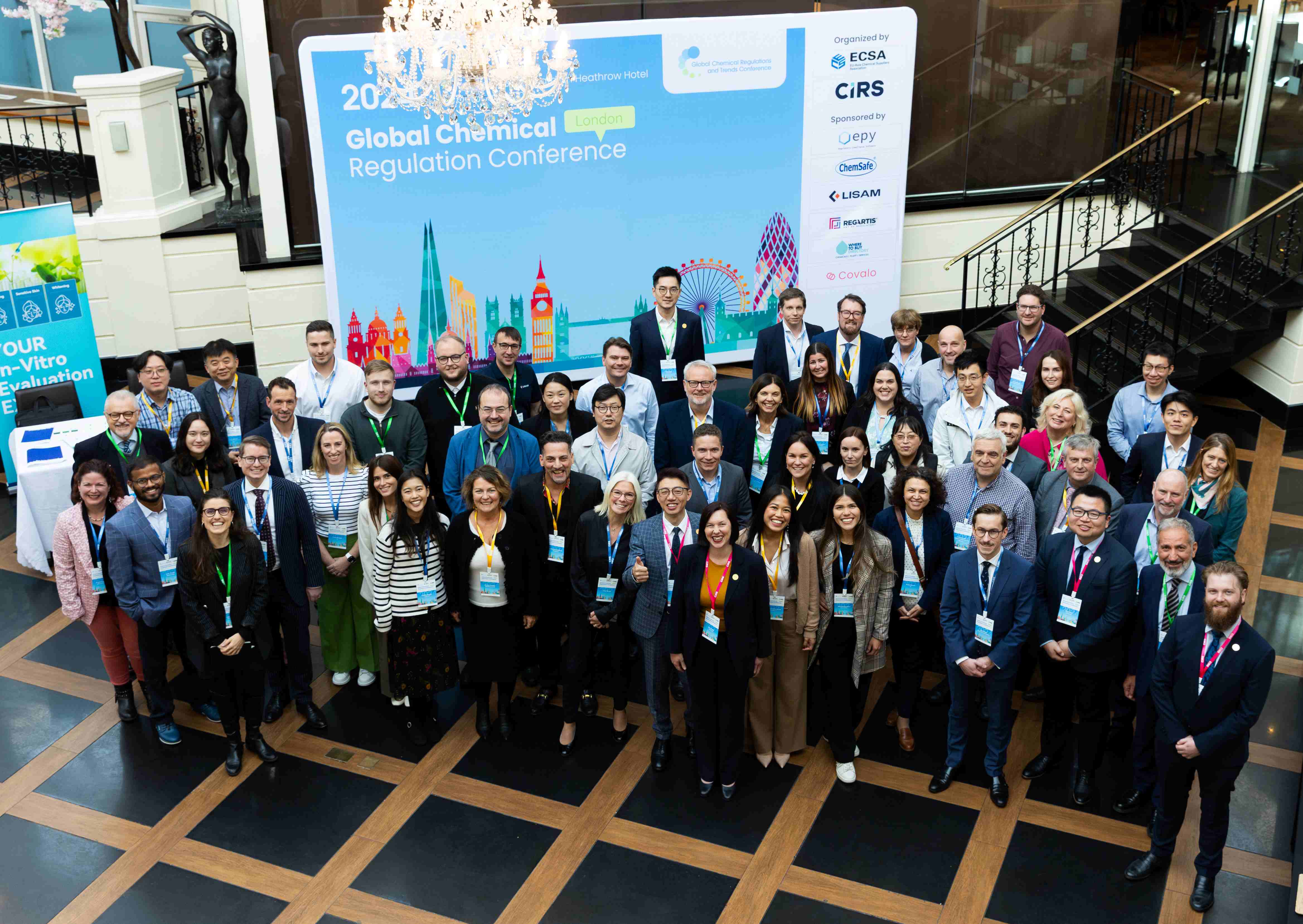

Once delegates have collected their name tags they can help themselves to refreshments and interact with our sponsors and other attendees.
We will kick off the event at 9am, covering all the important announcements for the day.
This presentation highlights key updates in EU chemical legislation, reflecting the evolving regulatory landscape aimed at enhancing health and environmental protection. It focuses on major policy updates and legislative initiatives currently shaping the future of chemical management in the EU.
Key Topics Covered:
● REACH Revision – The REACH regulation is undergoing revision, though the proposal has been delayed. Focus areas include simplification, improved data requirements, and stronger enforcement.
● PFAS Restrictions – A broad proposal is in development to restrict PFAS due to their persistence and risks. Final decisions are expected after detailed stakeholder consultation.
● Microplastics Regulation – New EU rules target intentionally added microplastics in products, aiming to reduce environmental release and pollution.
● CLP Regulation Update – The Classification, Labelling and Packaging Regulation is being updated to include new hazard classes and improve hazard communication.
● F-Gases and Other Substances – Measures are being introduced to phase down harmful substances like F-gases, Chromium VI, and certain siloxanes.
● Essential Use Concept – A framework is being developed to allow hazardous chemical use only when necessary for health, safety, or critical societal functions.
Marko Susnik, senior advisor at Austrian Federal Economic Chamber (WKO)
This session will provide a timely update on the direction of UK chemicals regulation, with a focus on proposed changes to UK REACH and associated frameworks.
Key Topics Covered:
Overview of GB Chemical Regulations
● UK REACH, GB CLP, GB BPR, GB PIC – the Windsor Agreement and Northern Ireland
● Brexit and its impact on supply chain – change of role in supply chain and impact on stakeholders – new duties, address details, reimports under EU REACH/ EU CLP.
UK REACH
● Registration update
● Transitional provisions – grandfathering, DUIN, NRES
● Deadline for UK REACH registration
● REACH consultation 2024 – and Alternative Transitional Registration model (ATRm)
● REACH consultation 2025 – extending the Registration deadlines.
GB CLP
● Areas of divergence from the EU
● Poison Center Notification (PCNs)
● Legal classification – the GB mandatory classification and labelling (MCL) list, how it is updated, and how you can follow it
● The future – proposal to reform GB CLP.
Dr. Kathryn Tearle, Regulatory Affairs Manager at BCF and Vice Chair of the CHCS.
Key Topics Covered:
● Importance of supply chain mapping
● Common disruptive risks facing the chemicals industry
● The evolving regulatory environment
● How platforms such as Transparency-One can assist
●
Anniken Buverud, Senior ESG Coordinator, ISN
This presentation examines the fragmented global implementation of the GHS and its real-world implications for internationally active businesses. It will highlight key regulatory differences and how diverging harmonized classifications impact global trade. Practical strategies will be shared to navigate compliance challenges across jurisdictions. Finally, we’ll introduce EPY X, an intelligent solution that simplifies and accelerates GHS compliance worldwide.
Key Topics Covered:
● A brief introduction to the GHS
● Global GHS Implementation: a fragmented reality
● Harmonised classification systems across key markets: EU, Americas, Asia, Australia
● Achieving global regulatory compliance with automated solutions: EPY X
Ziannah Pasion, regulatory affairs and sales specialist at EPY
Moderated by Tom Bowtell, Chief Executive Officer of the British Coatings Federation (BCF).
The chemical industry faces a defining moment, navigating climate goals, disruptive technologies, and global uncertainty. This panel brings together leaders from across the value chain to explore how resilience, sustainability, and innovation are reshaping the sector.
Discussion themes may include:
● Harnessing AI, digital tools, and green chemistry for transformation
● Accelerating innovation from biopolymers to low-carbon fuels
● Scaling circular solutions and aligning with evolving global regulations
● Turning sustainability from a compliance cost into a growth driver
Moderated by Tom Bowtell, Chief Executive Officer of the British Coatings Federation (BCF).

This presentation will cover key considerations for planning a test series on nanomaterials.
Key Topics Covered:
● How to obtain an appropriate particle size distribution?
● Testing the dissolution rate of nanomaterials
● Dispersion stability tests and their outcome
● Nanospecific analytics during ecotox studies
Dr. Ricki Rosenfeldt, CEO of nEcoTox
This presentation addresses the challenges and actions needed to shift regulatory frameworks toward fully integrating Non-Animal Methods (NAMs) in chemical and consumer product safety assessments. Despite legal requirements, the principle of animal testing as a “last resort” is inconsistently upheld, and many regulations still default to outdated animal-based models.
Key Topics Covered:
● Persistent regulatory gaps and slow adoption of NAMs due to outdated assumptions.
● Animal Free Safety Assessment Collaboration (AFSA)’s global strategy, led by Humane World for Animals, targets 8 key markets to establish a precedent and promote NAM enforcement.
● Development of science-based guidance to support regulatory use of validated non-animal tools.
● Integration of Next Generation Risk Assessment (NGRA) to support long-term regulatory change.
● Capacity building through the AFSA Master Class, designed to upskill regulators and stakeholders.
● A vision for consistent, ethical, and scientifically advanced animal-free safety assessments.
Jay Ingram, Managing Director, Chemicals at Humane World for Animals.
Ukraine REACH (UA REACH) came into force on January 26, 2025. This presentation offers a practical update on preregistration under UA REACH, drawing on nine months of hands-on experience. It will translate real-world cases into clear compliance roadmaps, unpack why “simplified” registrations aren’t really that simple, outline how CLP and SDS requirements are tailored to Ukrainian law, and highlight what customs officials and inspectors will begin to enforce from January 2026.
Key Topics Covered:
● Core legal requirements and responsibilities;
● Pre-registration timelines, common submission errors, and workarounds;
● The myth of simplified registration; and
● First-cohort insights: processing trends and enforcement outlook.
Inessa Kiristaeva, Customer Happiness Manager at REGARTIS and team leader of REGARTIS Ukraine
This presentation provides an overview of major regulatory developments across the Asia-Pacific region, with a particular focus on South Korea, China, and Japan. It highlights current compliance challenges, evolving chemical registration frameworks, and emerging regional trends relevant to global supply chains.
Key Topics Covered:
South Korean Regulatory Updates:
● Progress of 100–1,000 tonnage band registrations
● Challenges in registration processes and data requirements
● Recent updates to K-BPR and SDS compliance under KOSHA
China Chemical Regulations:
● Key hurdles in MEE Order 12 (China REACH) implementation
● QR code labeling and compliance across different provinces
● Updates on China's GHS alignment and carbon certification efforts
Developments in Japan:
● Overview of Japan’s chemical control laws and key compliance obligations
● New trends in chemical regulation, labeling, and risk management
● Introduction to CIRS Japan services and local support for regulatory navigation
Kyonga Park, general manager at CIRS Japan
This presentation outlines the structure and obligations of Türkiye's KKDIK (Turkey REACH) regulation, highlights key updates from 2025's "principles and procedures", and explores their implications for registration timelines, data sharing, and compliance coordination.
● Overview of KKDIK (Turkey REACH) obligations and structure
● Key updates introduced in the “Principles and Procedures” document published in January 2025
● Impact of the new framework on:
o Pre-registration deadlines and transitional timelines
o Lead registrant selection and SIEF coordination
o Mandatory data sharing and cost allocation rules
o Possibility of "temporary registration"
Özüm Özbek, Regulatory Affairs Consultant, CHEMLEG EUROPE B.V.
Moderated by Tim Doggett CEO of the Chemical Business Association (CBA)
Global disruptions and regulatory pressures are reshaping the chemical supply chain. This panel brings together experts to explore strategies for resilience, compliance, and sustainable growth in an uncertain environment.
Discussion themes may include:
● Risk management lessons from recent global disruptions
● Navigating evolving regulations and international standards
● Leveraging digital tools for transparency and traceability
● Integrating ESG into sourcing and supplier strategies
Moderated by Tim Doggett CEO of the Chemical Business Association (CBA)











